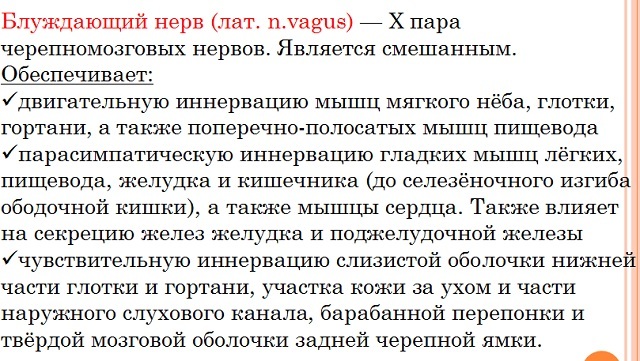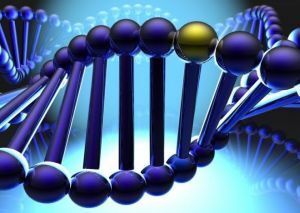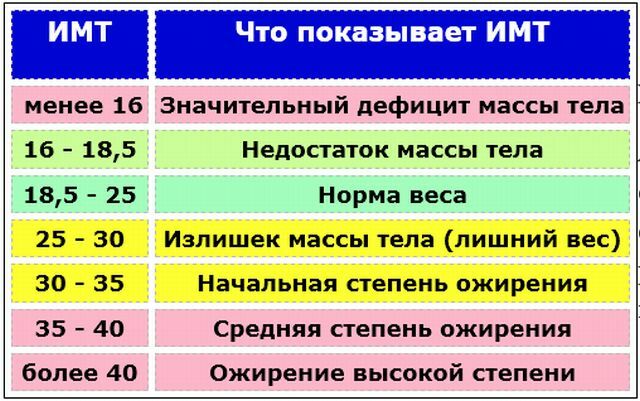 Some children have difficulties with the development of the school curriculum, and many educators and psychologists tend to call it school disadaptation, becausecan not find good reasons for such a state.
Some children have difficulties with the development of the school curriculum, and many educators and psychologists tend to call it school disadaptation, becausecan not find good reasons for such a state.
With a more detailed examination of the child, it can be revealed that his abilities and skills suffer from not gross violations of higher mental functions. The totality of such disorders, at the moment, is called the syndrome of minimal brain dysfunction or MMD.
This concept appeared comparatively recently - in the middle of the last century, and it covers a number of symptoms united in a syndrome that manifests itself as disorders of the central and autonomic nervous system, and affects various areas of the child's psyche: emotional, behavioral, motor, intellectual, and so on.
Neurological symptoms are also observed, but almost all disorders disappear or are significantly smoothed with age.
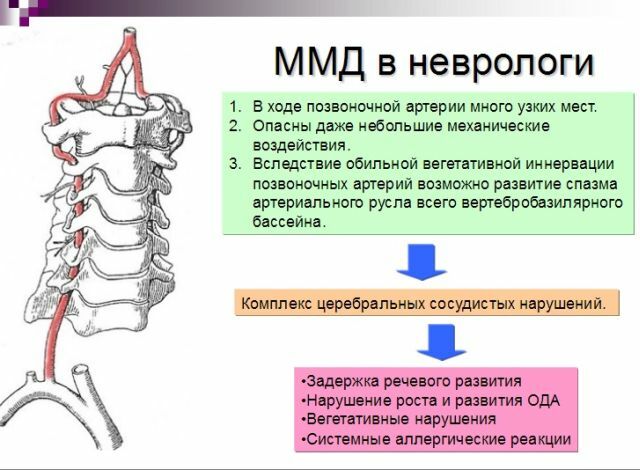
What provokes the development of the syndrome in children
The main reasons for the development of minimal brain dysfunction affect the fetus during pregnancy, or after childbirth, very rarely in early childhood. The main factors influencing the appearance of cerebral dysfunction are:
- hereditary predisposition;
- hemolytic disease occurs in the fetus, which develops in the case of Rh-conflict with the mother, which leads to the destruction of red blood cells in the child;
- various diseases and infections that the woman suffered during pregnancy;
- maternal anemia: malnutrition, vitamin deficiency, etc.;
- severe toxicosis;

- threat of abortion( miscarriage), for example, due to severe stress, hypertension or uterine hypotension, etc.;
- any harmful external influences on a woman during pregnancy: radiation, viruses, infections, bacteria, etc, this also includes a bad ecological situation;
- lack of oxygen( hypoxia), suffocation of fetus( asphyxia) in the course of labor, for example, hanging the baby's throat with the umbilical cord, or a long fetal passage through the birth canal;
- premature delivery;
- weak labor activity or, conversely, rapid delivery;
- spinal cord injury during labor;
- malnutrition in infancy and early childhood;
- development of such diseases in the infant, such as heart disease, bronchial asthma, infectious diseases, etc.
Complex of syndromes in the case of MMD
 Minimal brain dysfunction begins to manifest itself most vividly when preparing children for school or in junior classes.
Minimal brain dysfunction begins to manifest itself most vividly when preparing children for school or in junior classes.
It can be seen that a child does not absorb new information and is hard at remembering it, he has problems with writing and, in general, with a letter.
And it's not that your child has a low intellectual level or does not want to learn, the problem is that MMD affects every sphere of life.
With minimal brain dysfunction, the following symptoms and syndromes are observed:
- Sphere of attention of : arbitrary memorization is violated, concentration and volume are reduced. It is manifested mainly in the fact that the child is scattered, can not long engage in the same thing, especially if it requires mental exertion.
- Speech sphere : the first thing to pay attention to is the articulation of the child - the fuzzy pronunciation of words and sounds. You can also notice that the child sometimes perceives someone else's speech poorly, and does not learn the information by ear( violation of auditory memory).It manifests itself in the poverty of the speech stock, the difficulty of retelling heard or read, there are difficulties with the construction of long sentences.
- Disorders from memory : manifest mainly in the complexities of mechanical storage, i.e.by repeated repetition.
- Motor sphere : these children often can observe violations of fine motor skills of the hands. This is mainly manifested in the general awkwardness of movements and handling of objects. The child is difficult to fasten small buttons, tie laces, use scissors, sew, the school has difficulties with the accuracy of handwriting and reading speed.
- Spatial orientation of : such children are often confused with "left" and "right", they can write all the letters in a mirror image, etc.
- Emotional sphere : lability of emotional state. Children with this disorder quickly change their mood from depressive to euphoric. There may be irrational outbursts of aggression, anger, irritability, both to others and to oneself. You can observe the features of infantility( capriciousness), hysterical personality, lack of autonomy.
In infants, the main symptoms of the syndrome are as follows: 
- increased tearfulness and capriciousness;
- heart palpitations, sweating, respiratory rate;
- presence of spasms and convulsions;
- disorders of the digestive tract( gastrointestinal tract): frequent regurgitation, diarrhea, etc.;
- difficulties with sleeping and falling asleep.
The main syndromes that occur in school-age children on the basis of minimal brain dysfunction:
- hyperactivity and attention deficit disorder( fidgeting in the chair, inability to sit in one place);
- the child throws games and other things unfinished, can not concentrate on one thing for a long time, starts many actions at once;
- often loses things, falls, collides with objects and others;
- enters into conflicts, is capricious, aggressive towards relatives and themselves;
- there are problems with subjects that require high concentration of attention, long mental operations( mathematics, writing, memorizing poems).
Symptoms in adults:
- difficulties in learning new information and skills;
- Awkwardness in movements( uncertain gait, frequent falls);
- impulsiveness behavior;
- high irritability;
- violation of voluntary attention;
- a quick and unexpected change of mood for a short period of time.
Hypodynamic syndrome, as manifestation of MCD
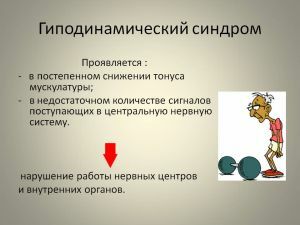 According to statistics, every fourth child with brain dysfunction has a hypodynamic syndrome.
According to statistics, every fourth child with brain dysfunction has a hypodynamic syndrome.
This disorder manifests itself in the general lethargy and inhibition of the child. The fact is that due to birth trauma, the subcortical structures of the brain are affected, because of this the stimulation of the cerebral cortex is insufficient, which is manifested by drowsiness, inhibition, etc.
The hypodynamic syndrome affects most areas of the child's health:
- muscular structures suffer, as a result of which there is a hypotension of the muscles, their underdevelopment, which affects the coordination of movements and strength;
- because of reduced motivational level, suffers attention, memory and cognitive abilities;
- emotional sphere is depleted, more often the face of such a child is indifferent, there are no bright emotional reactions in everyday life.
For example, in mobile games, you must adhere to the maximum reaction speed of the child, but then necessarily give a breather and encourage it in every possible way. Such children in the first place should be carried away by what they are interested in, and based on their interests to build an educational program, a program of physical development and leisure.
Treatment and correction
Correction of disorders in MMD is conducted in three directions: psychotherapeutic, medicamental and physical.
In the treatment of minimal brain dysfunction in children, medications are rarely used - they are mainly used as maintenance therapy. The main method of therapy will be a certain physical activity and psychotherapeutic effect.
Among other things, the following correction methods are needed:
- First, the should provide sufficient physical activity to the child : in case of hyperactivity, emotions and mobility should be released, and in cases of hypoactivity it is necessary that the loads are not prohibitive, but at the same timetime stimulated activity.

- Secondly, it is necessary for to provide a healthy psychological atmosphere in the family and surrounded by .It is important to create peace and stability, because they will help in correcting mood swings. One should not allow excessively strict discipline, but one should not be hyperopic or indulgence to whims.
- Thirdly, it is compulsory for to observe certain regime moments of ( to lie down and get up at the same time, allocate time for work and rest, etc.).
- Fourthly, develop the weaknesses of the child : play games that require the participation of fine motor skills, remember fairy tales and poems, but not mechanically - try to interest the child with content, etc. An important condition for treatment will be training with a psychologist, special educators and speech therapist.
Usually, predictions for a minimum of brain dysfunction are more favorable than with gross violations of the psyche. If the diagnosis was possible accurately and timely, parents and teachers interact actively and could develop the necessary tactics of communication with the child, then with age, the person is compensated for almost all violations, and he can live a full life.
In some cases, negative consequences of MMD may occur, they are mainly associated with improper diagnosis or negative influence of a close environment. In these cases, the child may develop depression, neurasthenia, complexes and other mental disorders.

